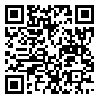Volume 7, Issue 5 (1-2015)
IJMEHM 2015, 7(5): 83-93 |
Back to browse issues page
Download citation:
BibTeX | RIS | EndNote | Medlars | ProCite | Reference Manager | RefWorks
Send citation to:



BibTeX | RIS | EndNote | Medlars | ProCite | Reference Manager | RefWorks
Send citation to:
Jalali M, Nasiri A, Abedi H. Patients and family members’ experiences regarding receiving bad news from health providers. IJMEHM 2015; 7 (5) :83-93
URL: http://ijme.tums.ac.ir/article-1-5468-en.html
URL: http://ijme.tums.ac.ir/article-1-5468-en.html
1- Islamic Azad University, Khorasgan Branch, Isfahan, Iran, and Shahid Rahimi Hospital, Birjand, Iran
2- Qualitative Research in Health Research Center, Birjand University of Medical Sciences, Birjand, Iran
3- Faculty of Nursing, Islamic Azad University, Khorasgan Branch, Isfahan, Iran.
2- Qualitative Research in Health Research Center, Birjand University of Medical Sciences, Birjand, Iran
3- Faculty of Nursing, Islamic Azad University, Khorasgan Branch, Isfahan, Iran.
Abstract: (10036 Views)
Breaking bad news to patients and their families is an important issue in health care services. Since access to information is among the basic rights of the patient, investigating the experiences of patients and their families after receiving bad news can make the process more purposeful and prevent unnecessary suffering. This study aimed to describe the experiences of patients and their families after hearing bad news from health providers.The present study was conducted with a qualitative, phenomenological approach. Participants were selected through purposive sampling from people who had the experience of receiving bad news during 2013 in Birjand, Iran. The sampling process continued up to the point of data saturation, which reduced the number of participants to 10. Note-taking was used to complete the data collection process. In this study Colaizzi's method was used for data analysis, while robustness of the study was assessed based on the criteria of precision.The subjects were between 25 and 70 years of age. First, according to Colaizzi's Method, 280 codes were obtained which were the same as the developed concepts. At this point, the code lists were extracted. Different thematic categories with similar meanings were placed in 5 thematically larger groups as follows: 1) tension at the beginning of the encounter, 2) adaptive responses, 3) spiritual relief, 4) family crises, and 5) seeking support.Patients and their families showed different reactions upon receiving bad news. The study showed that health providers can contribute to a better adjustment of patients and families and promote peace by acquiring a methodical approach while delivering bad news. This can be achieved by identifying the reactions, confusions and tensions, as well as introducing adaptive or supportive resources to patients and their families.
Type of Study: Research |
Subject:
Medical Ethics
Received: 2015/01/10 | Accepted: 2015/01/10 | Published: 2015/01/10
Received: 2015/01/10 | Accepted: 2015/01/10 | Published: 2015/01/10
Send email to the article author
| Rights and permissions | |
 |
This work is licensed under a Creative Commons Attribution-NonCommercial 4.0 International License. |





